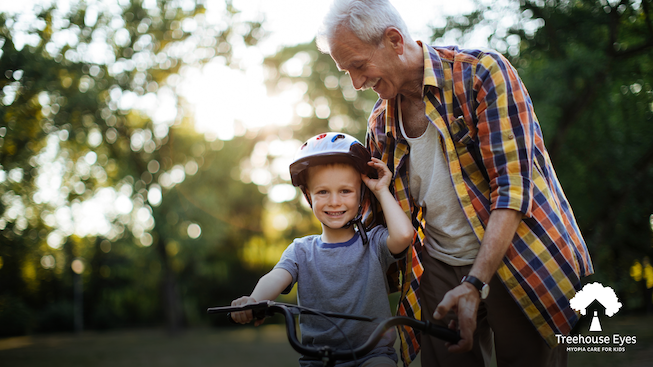Does Myopia Get Worse with Age?
What Is Myopia?
Myopia, also known as nearsightedness, is a common vision problem that will affect half the world’s population by 2050. It occurs when the eye is unable to focus on distant objects without corrective lenses like glasses or contacts. Myopia is caused by a variety of factors, including genetic and environmental factors, and tends to worsen with age.
Is Myopia Genetic?
If you’re thinking about myopia, knowing if its genetic is essential. If you happen to be myopic, then your kids might be at risk of developing the same condition.
Myopia has two types: genetic and non-genetic (or “acquired”). Genetic myopia is passed down through families and tends to run in certain clusters or patterns. Non-genetic means that individuals develop their vision issues without any family history or a genetic predisposition toward poor vision.
In general, suppose both parents have healthy eyesight but have children with poor vision (without any other eye problems). It’s likely that those kids were born with a form of genetic myopia known as Axial Myopia (AM). About half of all cases fall into this category!
Why Does Myopia Get Worse with Age?
When you find out your child is first diagnosed with myopia, it is essential to intervene as early as possible. Myopia progresses when a child’s eye grows too long from front to back, causing permanent and irreversible eye growth, known as axial elongation (the measure of the eye from front to back).
When a Treehouse Eyes doctor finds a low level of myopia (nearsightedness), it’s easier to treat with a wider range of treatment options. In short, myopia changes as we age due to axial length elongation that occurs during childhood. The longer the eyeball gets, it’s associated with serious eye conditions that can lead to permanent vision loss such as retinal detachment, glaucoma, and cataracts.
This is why it is imperative to treat myopia as early as possible and start getting your child’s eye examined annually to catch any changes in their vision.
How to Stop Myopia from Getting Worse with Age
To prevent myopia from getting worse with age, it’s important to get your child regular eye exams and see the treatment options for myopia such as custom contact lenses or prescription eye drops. If you’re concerned about your eyesight, it’s always a good idea to schedule an appointment with a Treehouse Eyes optometrist.
Conclusion
Myopia is a common vision problem that affects millions of people worldwide. It is caused by a variety of factors, including genetics and environmental factors, and tends to worsen with age. The key to properly treating myopia and preventing it from worsening is by catching it early, typically in childhood. By following the tips mentioned above, you can help prevent myopia from getting worse and maintain good eye health.
Let Treehouse Eyes Help Your Child Manage Myopia
Treehouse Eyes offer customized contact lenses and special prescription eye drops, and our doctors develop personalized treatment plans for each child. We will be able to determine which treatment plan works the best for your child at the first consultation with your Treehouse Eyes doctor. Schedule a consultation now to find out more.
